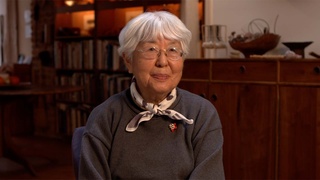Interviews
Difficulty getting work during World War II
Impossible to get a job, of course, you know. I had to get a job because, you know, financially, I had the…we didn’t have any more income because my father didn’t have the store any more and so on. So I went around looking for job and no one would give me a job. One person says, “If I hired you, you know, somebody will throw a brick through my window.” That is the kind of prejudice I faced in Salt Lake City.
But there were some others that were nicer. And then I think the shortage of help – just help…I went to work as a salad maker for University…Hotel Utah. Hotel Utah, which is still there, I think. And I worked there during my summer time for a while. I had several different jobs. I was able to get because there was such a shortage of help, you know, because all the men were gone to war and so on.
And then I finally got a job on a country club – golf course, private, Utah, Salt Lake City Country Club. Watering trees. But then there were some members of that club objected to the superintendent who hired me. You know, running the crew and he stuck up for us and said that, you know, “Where are you going to get anybody to water the trees if let these people…fire these people?” But there was a strong feeling about having any Japanese working on the country club. Maybe they felt they might sabotage the greens. So anyway, I finally got promoted to mowing the greens. You’ve got to remember there are 19 greens, including the practice green. Every morning, I got very early up in the morning and you had to sort of jog from green to green because you won’t be able to cover the whole place before the golfers start. So I cut all the greens for 2 summers.
That was while I was going to school. Then I had other job of…got a job correcting economic papers, you know, blue book. We call it “blue book.” Blue book and reading the term papers. It was a terrible job. 75 cents an hour I got in the school doing this job, 75 cents an hour. And I’d take home this stack of blue books and grade them and so on. I hate to brag, but only one test was upgraded by the teacher. Because they come complain, you know, and he would look at my grading and agree with my grading.
Date: December 8, 2005
Location: Oregon, US
Interviewer: Akemi Kikumura Yano
Contributed by: Watase Media Arts Center, Japanese American National Museum.
Explore More Videos

Discrimination faced in San Francisco (Japanese)
(b. 1937) A war bride from Yokohama

The riot in Manzanar
(b. 1921) Nisei veteran who served in the occupation of Japan

The Dopey bank that survived the war
(b. 1934) Award-winning Disney animation artist who was incarcerated at Topaz during WWII

Accepted by Japanese society as I learned more Japanese (Japanese)
(b. 1979) Sansei Nikkei Brazilian who lives in Oizumi-machi in Gunma prefecture. He runs his own design studio.

Evacuated to the Jungle
(b. 1938) Philipines-born hikiagesha who later migrated to the United States.

Captured by Guerillas after bombing of Pearl Harbor
(b. 1938) Philipines-born hikiagesha who later migrated to the United States.

Grandfather picked up by US Army
(b. 1952) Former banking executive, born in Hawaii

Father's business partner operated their farming business during WWII
(b. 1935) Sansei businessman.

Father was convinced the constitution would protect him
(b. 1935) Sansei businessman.


The lack of discussion about family’s incarceration in Amache
Sansei judge for the Superior Court of Los Angeles County in California


Being Confused about Racial Identity in Postwar United States
(b. 1932) Nisei American stage, film, and TV actress

Grateful for The Quakers’ help in camp and finding jobs outside of camp
(b. 1923) Japanese American poet, activist

Her brother’s reasons as a No-No Boy
(b. 1923) Japanese American poet, activist
